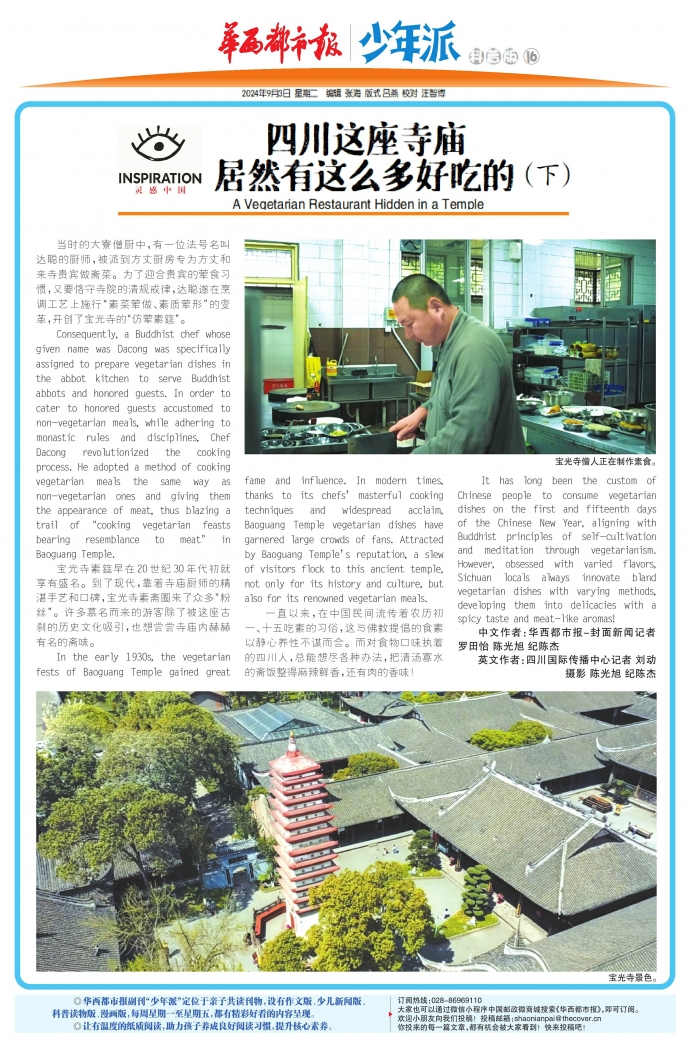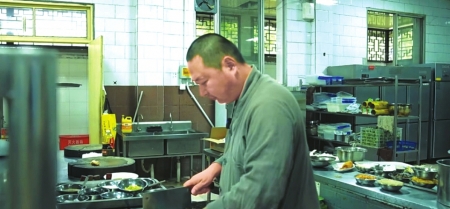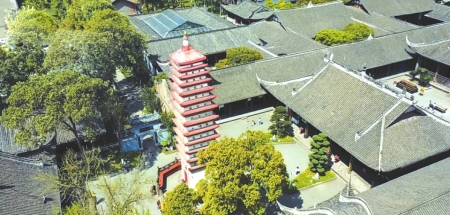四川这座寺庙居然有这么多好吃的(下)
A Vegetarian Restaurant Hidden in a Temple
宝光寺僧人正在制作素食。
宝光寺景色。
当时的大寮僧厨中,有一位法号名叫达聪的厨师,被派到方丈厨房专为方丈和来寺贵宾做斋菜。为了迎合贵宾的荤食习惯,又要恪守寺院的清规戒律,达聪遂在烹调工艺上施行“素菜荤做、素质荤形”的变革,开创了宝光寺的“仿荤素筵”。
Consequently, a Buddhist chef whose given name was Dacong was specifically assigned to prepare vegetarian dishes in the abbot kitchen to serve Buddhist abbots and honored guests. In order to cater to honored guests accustomed to non-vegetarian meals, while adhering to monastic rules and disciplines, Chef Dacong revolutionized the cooking process. He adopted a method of cooking vegetarian meals the same way as non-vegetarian ones and giving them the appearance of meat, thus blazing a trail of “cooking vegetarian feasts bearing resemblance to meat” in Baoguang Temple.
宝光寺素筵早在20世纪30年代初就享有盛名。到了现代,靠着寺庙厨师的精湛手艺和口碑,宝光寺素斋圈来了众多“粉丝”。许多慕名而来的游客除了被这座古刹的历史文化吸引,也想尝尝寺庙内赫赫有名的斋味。
In the early 1930s, the vegetarian fests of Baoguang Temple gained great fame and influence. In modern times, thanks to its chefs’masterful cooking techniques and widespread acclaim, Baoguang Temple vegetarian dishes have garnered large crowds of fans. Attracted by Baoguang Temple’s reputation, a slew of visitors flock to this ancient temple, not only for its history and culture, but also for its renowned vegetarian meals.
一直以来,在中国民间流传着农历初一、十五吃素的习俗,这与佛教提倡的食素以静心养性不谋而合。而对食物口味执着的四川人,总能想尽各种办法,把清汤寡水的斋饭整得麻辣鲜香,还有肉的香味!
It has long been the custom of Chinese people to consume vegetarian dishes on the first and fifteenth days of the Chinese New Year, aligning with Buddhist principles of self-cultivation and meditation through vegetarianism. However, obsessed with varied flavors, Sichuan locals always innovate bland vegetarian dishes with varying methods, developing them into delicacies with a spicy taste and meat-like aromas!
中文作者:华西都市报-封面新闻记者罗田怡 陈光旭 纪陈杰
英文作者:四川国际传播中心记者 刘动
摄影 陈光旭 纪陈杰



